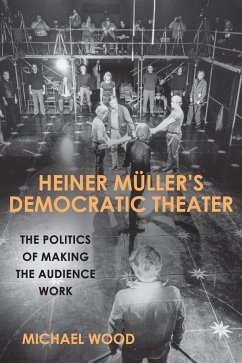The East German playwright Heiner Müller (1929-1995) is one of the most influential European playwrights and theater directors since Brecht. While critical literature on Müller often discusses the politics of his texts, analysis often stops at the level of the text, to the neglect of the theatrical events that emerge from it. Moreover, little consideration is given to the audiences for which Müller's texts were written and performed. Michael Wood addressesthese gaps in scholarship, making an original contribution to the understanding of Müller's work as playwright and director. In 1985, Müller spoke of the importance of a "democratic" theater: one that confronts theatergoerswith densely contradictory material that they must interpret for themselves, in so doing encouraging them to recognize the complexity of their material reality and question their participation in political life. Wood's study showsthat Müller sought to do this in his combined 1988 production of Der Lohndrücker, Der Horatier, and Wolokolamsker Chaussee IV: Kentauren, staged at a time when questions of democracy were at the forefront ofEast German consciousness, but also demonstrates that from the beginning of his career Müller tried to write "democratic" theater and anchor new, more open possibilities for audience response. Michael Wood is Susan Manning Postdoctoral Research Fellow at the University of Edinburgh, where he received his PhD in 2014.
Hinweis: Dieser Artikel kann nur an eine deutsche Lieferadresse ausgeliefert werden.
Hinweis: Dieser Artikel kann nur an eine deutsche Lieferadresse ausgeliefert werden.








